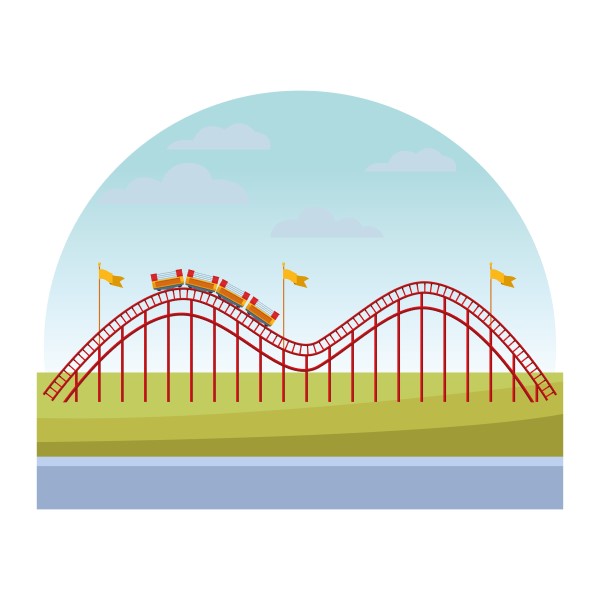A Cure for the Boring Middle
Somehow as a society we’ve neglected a crucially important part of education. People just don’t learn about personal finance anywhere. Four years in college and eight years on Wall Street didn’t move the needle on that front for me.
Perhaps that’s why I fell so head-over-heels for personal finance when I finally started picking it up – from books and from Mr. Money Mustache, primarily. That “Where have you been all my life” deprivation led to a protracted honeymoon phase with the topic.
Suddenly I saw a way out of the 9-to-5 til you’re 65 grind, and I was enamored.
Fast forward to my last year on Wall Street, with a fat emergency fund and a new perspective on what money was actually worth. I was about to pull the ripcord, and it was exciting.

Fast Forward Through What?
Notice how I skipped ahead? It’s that “move along, nothing to see here” part of the Financial Independence life-cycle that is where most of life actually happens for most people. So, let’s go back and explore it.
When you first find out that there is a way to take control of your own financial life, it is incredibly invigorating, and preemptively liberating. When you’re just about to finally hit eject from the grind, the excitement is palpable. But for many people, the part in between just plain sucks.
The Boring Middle
Between the exciting epiphany at the start and the imminent anticipation at the end of your journey to Financial Independence is a period of years, and often decades, aptly referred to as “The Boring Middle.”
This happens once the infatuation phase with your new way of conceptualizing your life wears off, when there’s still plenty of time until you achieve your goal, but you must trudge onward.
This is where many people can fall off the wagon, and it’s easy to see why. It’s easy to sustain an austerity budget for a year when you’re in the throes of a passionate tryst with a new financial way of being. (Sick of the romantic analogies yet?)
But what about when you’re three years into a belt-tightening regime, and staring down the barrel of another decade of self-deprivation? Not so easy anymore.
A Complicating Factor
Another unexpected element makes this even more difficult. Once you have made meaningful progress toward your goal and have accumulated investments commensurate with that progress, your sense of control can take a big hit.
The more money you accumulate, the more the swings in the market will begin to dwarf the impact of your efforts toward saving money. If you pack your own lunch for a month to save $200 and meanwhile your portfolio is up or down by $10,000, it’s easy to feel like what you’re doing just doesn’t matter in the grand scheme, regardless of whether the market is up or down.
A Brutal Combination
When you combine the fatigue that comes from prolonged effort after the exciting epiphany has worn off with the growing realization that the market has far more impact today on your net worth than you do, it’s very easy to take your eye off the ball.
But when you do, you’re likely to feel guilty. You still believe in your long-term plan, but you can’t help but feel unfaithful when you get sick of your beans and rice and spring for sushi.
Then comes the reaction to the guilt. You tell your beloved budget, “I’m so sorry, it will never happen again,” or, you’re fed up and say “I think we should start seeing other financial plans.”
The first is unrealistic, and the second is arguably worse than never hearing the sweet gospel of Financial Independence in the first place, as you’ve now soured on the whole idea that Financial Independence is something that is possible for you.
But Why?
So why do we do this to ourselves? As humans, we are inherently uncomfortable with ambiguity. We love all or nothing solutions because they are simple. When things are simple, they are easy to understand, and when they are easy to understand, that makes it much easier to make the right decision.
But as humans, we are also subject to varying levels of motivation. If you saw a good path to Financial Independence and you were a robot, all that would be left is to execute that plan. As a human, how you feel tomorrow will impact how willing you are to follow commands issued today.
Sometimes these all-too-human traits come into conflict with one another. The simplicity of an austerity budget makes it that much easier to make decisions that align with that budget, but the impact of the austerity budget on your motivation several months (or years) in can make you that much more likely to overreact and ditch the discipline altogether.
Reconceptualizing
There’s nothing wrong with loving simplicity. I’m a huge stickler for simplicity. But perhaps there’s a different way to graft in some simplicity than to approach your financial life with a caveman “saving good, spending BAD!” mantra.
What if there were a way to retain simplicity while making the Boring Middle not something to be grudgingly gotten through, but something to be embraced and savored?
That simplicity comes from a redenomination of your financial life from dollars into years. When you track your life in dollars, you are much more likely to embrace the caveman mentality. A dollar is a dollar, after all.
However, dollars don’t tell us how to think about our decisions in terms that actually make sense to us. Should you put guacamole on your burrito for a couple extra bucks? Two dollars is approximately 0.00% of what you need to have saved up for retirement, so who knows?
If you treat it in terms of time, you’re a lot better able to see whether this “luxury” aligns with your long-term goals. Let me explain.
Guacamole Time
Let’s say you get a burrito twice a week. It’s your favorite food in the whole world. That guacamole will set you back $4 per week, or roughly $100 per year. We’ll skip the math here for brevity (ChroniFI can handle that for you), but it’s a straightforward (though involved) calculation to see how much that guacamole delays your retirement.
It’s entirely plausible that you’d find that that repeated choice to get the guacamole is delaying your retirement by 2 weeks. Now you at least have a way to make an intelligent choice.
Maybe you hate your job and the guac doesn’t make a huge difference in how much you enjoy the burrito. In that case, skip the guac (or more importantly get a better job). Maybe you love your job and you live for guacamole. In that case, treat yourself – this is what money is for.
The point is that by looking at spending choices in terms of time, we have a new route to simplicity that was not previously at our disposal.

The Enjoyable In-Between
With this framework in mind, there’s no need to wait until retirement to finally be happy. All those things you’re waiting to enjoy in retirement? If they’re worth it, pull them forward and start enjoying them now.
Being unhappy at work drives many to sprint toward retirement to avoid that unhappiness as soon as possible. But in the process, that sprint and the self-deprivation it entails is liable to make you unhappy at home too. If you make yourself unhappy at home because you’re unhappy at work, it doesn’t take a math major to tell you that you are just plainunhappy.
If you’re Spock and can handle massive austerity for years or decades at a time, then maybe you can achieve it. But even if you could, would you want to?
So many of us are so focused on getting from A to B that we miss out on the journey and the joys it can entail. Before you think I’m going all Eckhart Tolle on you, consider what I’m saying.
If you could retire in 10 years by making yourself unhappy, or you could indulge a bit in creature comforts and retire in 20 years by making yourself happy, which would you choose? For me, it’s obvious. I’d take 20 years of happiness over 10 years of unhappiness any day. Who knows, you may not even make it until retirement.
We have a real chance to transmute the “Boring Middle” into the “Enjoyable In-Between” as long as we pursue the right form of simplicity.
Conclusions
We are not robots. We are subject to motivation that waxes and wanes. With this in mind, it is particularly important to pick a route to Financial Independence that is not only possible, but also sustainable.
Making as many decisions as we do in the modern world is exhausting, so it’s understandable that we like to simplify things. When we learn that Financial Independence is achievable and that saving money is how we do it, the caveman mentality is a response that makes sense – at first. How else would we know when it is right to splurge and when it is right to save? If we’re counting in dollars, it’s practically hopeless.
If we understand our decisions in terms of time, and more generally place an appropriate value on our happiness through time, we are well-equipped to make those decisions in a way that makes sense.
From the standpoint of your likelihood of eventually achieving Financial Independence, it is important to not waste money on things that don’t help you achieve your long-term goals. But it is every bit as important to invest in spending on the things that do.
Do your future self a favor and run the numbers. Treat yourself to those things that will keep you motivated and happy at all points along the journey. As long as they fit within your long-term plan, you’ll get there eventually.
As an added bonus, you won’t have to wait until retirement to enjoy your life. You can pull those joys forward and start experiencing some of them right now.
Ben Miller
Founder of ChroniFI
February 2022

Share This Post:
Subscribe to the Blog
No spam. Just an update when there's something new.
The foregoing are the opinions of the author and are for educational purposes only. They do not represent professional financial or investment advice. For financial advice, please consult a licensed financial professional.